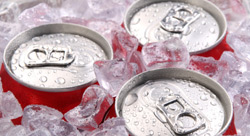Chemical Process Engineer Uses Mathematica to Handle Soft Drink Formulations
- Numeric—to solve higher-order partial differential equations
- Symbolic—algebraic manipulation, ordinary differential equations
- Graphic
- Programming—saves writing many routines in Fortran
Does every can of your favorite soft drink taste as good as the last one? Well, it should, especially if it's one of the formulations handled by International Flavors and Fragrances' Tom Jones, a chemical process engineer who uses Mathematica in his quest to get these things juuuuust right. To accomplish this he has to determine how to best isolate natural chemicals from botanical sources, for customers are known to have a keen sense of taste and smell.
"I use Mathematica to investigate how molecules interact in a liquid mixture," explains Jones. "Their interaction determines how they relate to one another during processing. In the distillation process, for example, we need to separate many components in a mixture into pure compounds by heating the mixture to the boiling point and condensing the vapors. With Mathematica, I can build models of this process that include extensive use of algebraic summations and thousands of data points to predict the interaction between chemical components."
Without Mathematica, each formulation would involve a lengthy and expensive set of experiments. "Or we could lease a process simulator to do the job, at a pricey $10,000 per year," says Jones.
Get started with Wolfram technologies, or work with us to apply computational expertise to your projects.
Questions? Comments? Get in touch: 1-800-WOLFRAM, or email us »























